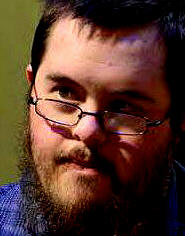 A story from the Champion Centre: On a wintry Sunday morning a group of actors sits in a circle talking through the consequences of making a change to a scene in the soap opera they are creating. Guided by their director, they think about what the man who wakes up from a coma following an accident is going to remember of his life: will he remember that he has betrayed his wife who is about to divorce him? Will he remember any of the things that the people who visited him in the hospital said to him?
A story from the Champion Centre: On a wintry Sunday morning a group of actors sits in a circle talking through the consequences of making a change to a scene in the soap opera they are creating. Guided by their director, they think about what the man who wakes up from a coma following an accident is going to remember of his life: will he remember that he has betrayed his wife who is about to divorce him? Will he remember any of the things that the people who visited him in the hospital said to him?
And later in improvising the scene in which the accident happened and the man is on the point of revealing his betrayal to his friend, the actors struggle against the urge to tell all and have to think carefully about how one pretends not to know what one does actually know. This is Tony McCaffrey in rehearsal with 'A Different Light', Christchurch's mixed ability amateur theatre company.
Peter Rees, a member of the cast, has Down syndrome and attended the Champion Centre from just two weeks old until he went to school in 1994. His transition to school report noted that Peter was a boy who 'shares with us a real joy in learning and living – and who is a joy to know'. His 'quiet, cheerful, gentle personality...with a twinkle in his eye' was noted, even as a small boy, and it is clear he has not lost that approach to life as he has grown, gone on to primary and then secondary school. He has, however, added a magnificent beard as he has entered adulthood and this makes him look older than his twenty-two years.
'A Different Light' is not Peter's first experience of theatre, having been in school plays at Mairehau High School. At high school he also successfully completed Levels 1 and 2 of NCEA, showing a particular aptitude for mathematics. He now has a part-time job at a busy restaurant/bar, and attends the CPIT Lifeskills course.
As the rehearsal progresses, I learn that Peter plays the part of a successful business man, 'Ed', who, years before, fathered a child who, we are about to find out, is the accident victim in a coma. When Ed enters the hospital room of the young man, he tenderly touches the young man's hand, promises him the best care that money can buy, and reveals the nature of his relationship with him. Does the son hear his father? Will he remember when he awakes? For the moment this is left open. What we can be sure of is that this father loves this son; and the way Peter practises cradling a baby doll while waiting to go on stage, reveals his thinking about the fatherly relationship he is about to portray.
Peter has, with patience and effort and the support of the Champion Centre, his family and his teachers, reached goals that many thought were unachievable. The road ahead, however, gets no less steep and Peter tells me he is concerned for his future. Clearly his hard won skills are not being fully used yet and he must rely on the wider community to provide opportunity for him to use and develop the skills he has put so much effort into gaining.
By Dr. Susan Foster-Cohen of the Champion Centre, New Zealand.
This story is taken, with permission, from the Annual Report 2011-2012 of the Christchurch Early Intervention Trust.


 A story from the Champion Centre: On a wintry Sunday morning a group of actors sits in a circle talking through the consequences of making a change to a scene in the soap opera they are creating. Guided by their director, they think about what the man who wakes up from a coma following an accident is going to remember of his life: will he remember that he has betrayed his wife who is about to divorce him? Will he remember any of the things that the people who visited him in the hospital said to him?
A story from the Champion Centre: On a wintry Sunday morning a group of actors sits in a circle talking through the consequences of making a change to a scene in the soap opera they are creating. Guided by their director, they think about what the man who wakes up from a coma following an accident is going to remember of his life: will he remember that he has betrayed his wife who is about to divorce him? Will he remember any of the things that the people who visited him in the hospital said to him?